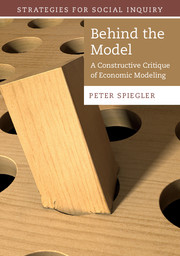6 - Why reform?
from Part III - A reform proposal
Published online by Cambridge University Press: 05 December 2015
Summary
Chapters 2 and 3 identified shortcomings inherent in mathematical economic modeling methodology that render contemporary economics blind to certain kinds of explanatory failure. In Part III, we turn to the question of how to move beyond recognizing the problem to actually addressing it. In rough terms, this task corresponds to answering two questions: So what? and What should be done about it?
The current chapter addresses the first of these questions, arguing that the problems identified in Parts I and II cannot be safely ignored because they can pass undetected through economics' current assessment methods even when they have serious empirical consequences. I demonstrate this by first providing more detail on precisely what kind of information economists would need to detect these problems, and then arguing that our current methodology is both ill-suited to gathering and processing such information and blind to the need to do so. These arguments set the stage for the presentation of a reform proposal, in Chapter 7, that addresses both of these shortcomings.
The problem
As was argued in Part I above, the use of a mathematical model implies a commitment to the view that the subject matter under investigation can aptly be represented mathematically. Specifically, mathematical modeling presupposes that the objects under investigation are plausibly stable, modular, and quantitative, with no qualitative differences among instantiations of each type, and that the relations between them are fixed and law-like throughout the context under study in the modeling exercise. But the validity of this presupposition can be demonstrated neither by the mathematical model itself nor by any inferences drawn from it. It can be secured only by independent evidence that the subject matter under investigation conforms to that description. The question to be explored, then, is how to secure this evidence. What should we be looking for in the target subject matter and how should we go about looking for it?
To fix terms, and for the sake of expositional simplicity, in what follows I will refer to phenomena possessing the properties cited above as “modular-stable.”
- Type
- Chapter
- Information
- Behind the ModelA Constructive Critique of Economic Modeling, pp. 145 - 164Publisher: Cambridge University PressPrint publication year: 2015

